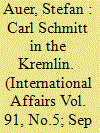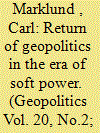| Srl | Item |
| 1 |
ID:
141278


|
|
|
|
|
| Summary/Abstract |
The protracted crisis in Ukraine has exposed fundamental political differences between leaders in western Europe and their counterparts in Russia. The very existence of the European Union was meant to have refuted geopolitics as a useful theoretical lens through which to view power relations in Europe. After all, the European project is based on the idea that boundaries no longer matter and that national sovereignty is obsolete. And yet, geopolitics remains critically important—certainly for Europe's potential enemies, but also for Europe itself. It is poignant that to advance our understanding of this new constellation we are well served to turn to the insights of a classic, if hugely controversial, German political thinker: Carl Schmitt. Schmitt's political philosophy is relevant in three aspects. First, as a source of inspiration—even if only indirectly—for the contemporary Russian political establishment. Second, the behaviour of Putin's Russia, particularly since 2008, can be best understood through some of the key concepts that preoccupied Schmitt: sovereignty, the political and geopolitics. Third, Schmitt's philosophy can serve as a point of departure for reflecting on the possibility of a more robust response by Europe to the Russian intervention in Ukraine. What Europe needs is a more hard-nosed realist approach, which recognizes that Russia's expansionist ambitions can only be constrained by its own readiness and willingness to deploy power both politically and, if necessary, even militarily.
|
|
|
|
|
|
|
|
|
|
|
|
|
|
|
|
| 2 |
ID:
138976


|
|
|
|
|
| Summary/Abstract |
This paper looks at how Swedish political scientist Rudolf Kjellén (1864–1922) conceived of the relationship between nature and culture, between material and immaterial power as well as the role of soft power, geopolitical imaginary and competitive identity in off-setting potentially unfavourable geopolitical conditions for small and medium-sized states. It is argued that with regard to small states, Kjellén did not maintain a consistent separation between “soft” cultural resources of power and “hard” laws of nature. Rather, he placed the mutually constitutive tension between geography (nature) and politics (culture) at the centre of his politico-scientific analysis, arguing that active “biopolitics” could supplement geopolitics. In Kjellén’s conception, cultural and natural resources are instruments of an otherwise integrated notion of power which challenges the contemporary separation between hard and soft power.
|
|
|
|
|
|
|
|
|
|
|
|
|
|
|
|